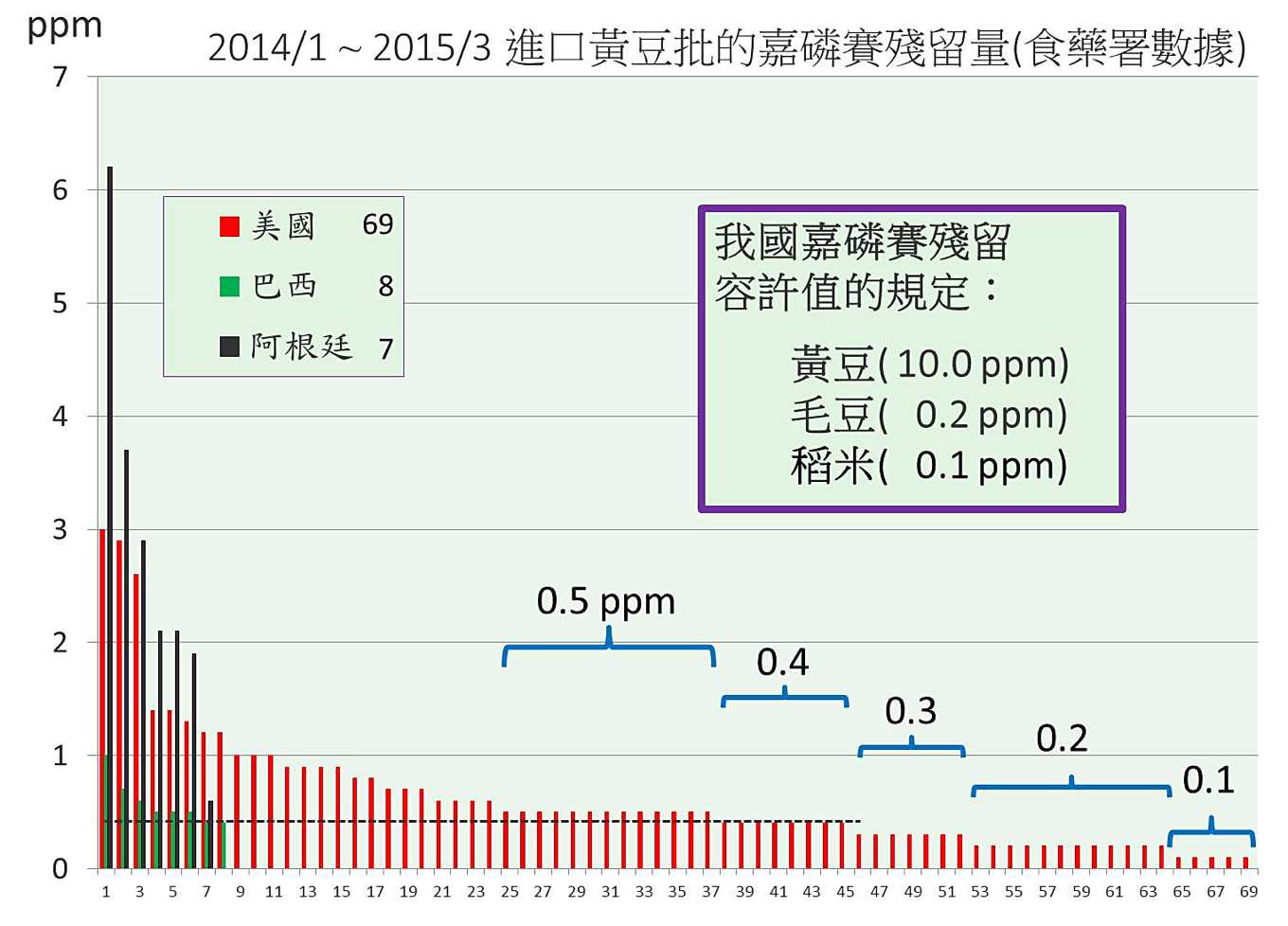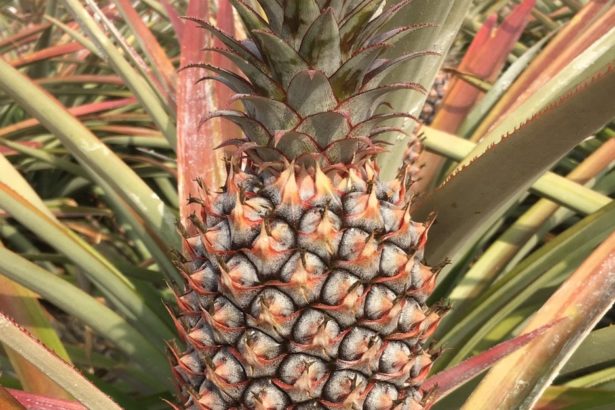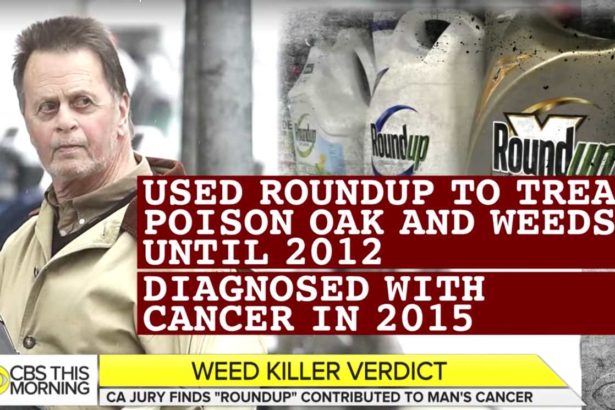Taiwan plans to greatly relax the residue of herbicide Jiaposi! Imported wheat, oats and other 10 items of miscellaneous grains, the maximum allowable 10ppm
Share
The American public has sued Monsanto and Bayer's herbicide Glyphosate for causing cancer, and the pesticide company has lost one after another. Vietnam and Thailand have announced that they will ban it in 2020, and Malawi will also stop importing it. However, at this controversial moment, the Chinese government is considering relaxing the residual allowance of CAP. (click here to read the contents of the announcement)
Chinese people eat high consumption of wheat, oats that they often eat for breakfast, and 10 items of miscellaneous grains, such as barley, rye and rapeseed. Two wheat standards are relaxed, while other grains are not allowed to be detected by 10 ppm. In the future, the possibility of residual domestic food in Jiapusai has greatly increased, making it difficult for civic groups that have been concerned about this issue for many years to accept, saying: please tell the government what is the necessity of opening up this time. Or is it just for manufacturers and international trade? (the EU decided that the pesticide review should be made public, please click to read)


The Food and Drug Administration has provided legislators with batch-by-batch data on border inspection of imported soybeans (courtesy of Guo Huaren)
Scholar: the United States Congress proposed a bill to tighten the standards, but our country relaxed it as an unwise move.
Guo Huaren reiterated the contradiction in the setting of residue tolerance: "Why is there so much standard deviation between edamame beans and soybeans?" Soybeans are grown in China. The allowable amount of soybeans is 0.2 ppm. Soybeans are mainly imported and the allowable amount is 10ppm, with a difference of 50 times. However, we eat much more soybeans than edamame beans. If you use the standard of edamame, more than 80% of these imported soybeans exceed the standard.
Guo Huaren pointed out that it was only last month that members of the US Congress introduced a draft of the 2019 Food Safety exemption Act, which requires a reduction in the allowable amount of caramel residues in oats. In the past two years, there have been a lot of new research reports on the risk of health, including at least 13, which have not been taken into account when countries set the residual allowable value. Therefore, it is indeed unwise for the Food and Drug Administration to give advance notice of relaxation at the request of Monsanto.
"the government is not concerned about consumer safety at all, but based on the convenience of traders," stresses Kuo Hua-Jen. In addition to human health, domestic agriculture should also be considered. If Taiwan importers were able to achieve such a low allowable value in the past, why relax it? And now the government wants to promote the resumption of domestic miscellaneous grain cultivation. "isn't it better for our agriculture to maintain the original standard?"
The Bureau of Prevention and Inspection explained that the method of determining the allowance for pesticide residues depends not only on food intake, but also on the mode of planting, so it adopts total quantity control, not setting standards for the intake of individual crops.
Although officials say that most of the crops relaxed this time are imported grains, which does not have much impact on domestic farmers, the country has just begun to restore wheat and oats, and the authorities have not opened the Garnet plug to be used on these grains at all, creating a paradoxical situation of "treating others with leniency and strict self-discipline".
Civic groups: in the past, oatmeal could not be detected, so how can people be exposed to higher risks?
Chen Ruwei, co-sponsor of the Campus lunch campaign, has been following Jiaposai information at home and abroad for many years. With regard to the official list of 10 additional crops this time, he believes that the government must make it clear: what is the necessity of opening up? Or is it just Monsanto's application, and we just follow the procedure? Isn't that just for manufacturers? Why do people need to expose themselves to higher risks?
Chen Ruwei pointed out, "although Monsanto applied through normal channels, over the past six months, whether it is the verdict of cancer risk lawsuits abroad, and Monsanto has hidden experimental data, this should be taken into account in the FDA review process, because the government can only rely on the research report provided by Monsanto."
Chen Ruwei cited the previous market sale of Quaker oats as an example: "the residues were detected and were imported in parallel, while Quaker oats from Taiwan manufacturers have not been detected for residues." There were two voices in the discussion at that time. Some people said that Taiwan's laws and regulations were too backward and that there were Garnet standards for oats abroad, and that Taiwan should formulate them. "but on the other hand, Taiwan companies can detect no residues, and since someone can do so, the Taiwan government should not give in."
Vietnam, Thailand, Malawi and others will ban the import of gablux, and the government should exercise more stringent control.
The Housewives Union Environmental Protection Foundation firmly opposes the government's increase in the residual capacity of gabion plugs. Executive Director Zhang Yuling pointed out that Vietnam has announced that it has stopped importing it, and Malawi has also announced to follow suit. The Thai government has also announced that it will ban gaboset, paraquat and Taosong in 2020, first halving imports. Now that there is so much international controversy, China not only does not have stricter control measures, but also adds 10 crops, which is basically a threat to the health of consumers. She stressed, "the government should have more rigorous discussions and should not only cooperate with the applicant Monsanto."
The review process of pesticide residues has always lacked room for the public to have a say, and there are only a few words in the meeting report released by the Food and Drug Administration, and there is no way for the public to know why the government made this decision.
Non-governmental organizations hope that the government can stand on the principle of early warning. This time, the increase in the tolerance standard will have little impact on Taiwan's farmers, but it will have a great impact on consumers. Although pesticide companies and the government have all along considered that the toxicity and risk of caroxifen is low, in recent years, some international studies have concluded that it may also cause genetic changes at low concentrations, which can affect the second or even the third generation in mouse experiments. "so of course, the less the consumer's intake, the better. If this is also allowed, and that is also allowed, taken together, the more open up, the more public exposure will be," says Chen Ru-Wei.
In order to avoid unprovoked panic among the public, officials must first make public the review of pesticides.
In the past, whenever there was an open issue on pesticides, public opposition was often regarded as populist by the government, which was not scientific, rational or professional. However, if the authorities are unable to explain clearly the reasons for opening up, and if there is no open and transparent deliberation process, it is inevitable to incur doubts in a democratic society.
In recent years, the international controversy over Gaposet has even revealed that the banner of scientific rationality may also be manipulated, that is, scientists may also be divided into support and opposition camps, and pesticide experiment reports that seem detached and follow the "laboratory best practice" (GLP) standards are not unshakable. In addition to passively accepting the data of pesticide companies, the Taiwan government should take the initiative to establish an independent evaluation model, strictly examine the disputed pesticides and take the initiative to investigate. The public should also cherish the last opportunity to express their views and reflect them online within the 60-day period announced by the Food and Drug Administration.
Note: pan Zhikuan, head of the Food Section of the Food and Drug Administration, said that before this revision, the "ADI CUP" of Jiaposai was 7.9%, but after the revision, it was only increased to 12.6%, which is 80% away from the upper limit of the safety range, and there is still a lot of room for adjustment.
(for related news, please click here.)
Is the pesticide audit agency just the mouthpiece of the pesticide factory? The European Parliament revealed that Germany's Gaposse censorship directly copied the Monsanto report.
After long-term spraying every spring, the amateur gardener also got lymphoma and mistakenly believed in Monsanto's advertisement: Jiaposai is safer than salt.
The cancer risk report of Jiaposai has been exposed! Monsanto has been under pressure for four years, and the black hole finally shows its dawn every spring.
Monsanto deliberately concealed the cancer risk of Garrette for 40 years. The court awarded NT $9 billion in the Johnson & Johnson case, and 4, 000 Americans waited to go to court.
Monsanto documents are exposed! Taiwan is also the object of courting │ to bribe experts to name it, whitewashing the cancer risk of Garnet.
Pesticide consumption in Taiwan has reached a 17-year high! The US court ordered Garrette to pay sky-high compensation and ban Taosong for the protection of babies. Will Taiwan follow suit?
Sales of herbicides in Taiwan hit a record high! The annual sales are 2.6 billion yuan, and the consumption per unit area is among the best in the world.
There is no excessive amount of ─ herbicide in Cuncao, which impacts the soil ecology and increases the risk of cancer.
- Prev

Yuanyang forest-pineapple orchard assisted by metrology
Yuanyang forest-pineapple orchard assisted by metrology
- Next

Long-term spraying of herbicides every spring, amateur gardeners also get lymphoma, mistakenly believe Monsanto advertisement: Jiaposai is safer than salt
Long-term spraying of herbicides every spring, amateur gardeners also get lymphoma, mistakenly believe Monsanto advertisement: Jiaposai is safer than salt
Related
- A course of planting techniques and methods on how to grow carrots
- How to plant the latest tulips?
- Is it better to pick tea in the morning or in the afternoon? When is the best time for tea to be picked? what is the third or fifth tea?
- Launch Yuanxiao Happy combination Haocha + Tea Yuan healthy Taste
- Penghu Tourism "Fireworks 20 Parade with You"
- 2022 West Lake Happiness holds "Digital Revitalization Voucher" and draws iphone13 and laptop.
- Banqiao Fuzhou social houses are designed to change start-up combined with police elimination to create a safe and livable environment
- The convenient measure of "mechanical weeding" in Xinbei has been abused and the Agriculture Bureau has imposed heavy penalties on the illegal land consolidation.
- Changgeng University Joins Hands with Four Memory Factories to Rescue Memory Talent Shortage
- The list of Taiwan's top 100 MVP managers is listed by the Director-General of the Farmers' Association of Sanxia District.

